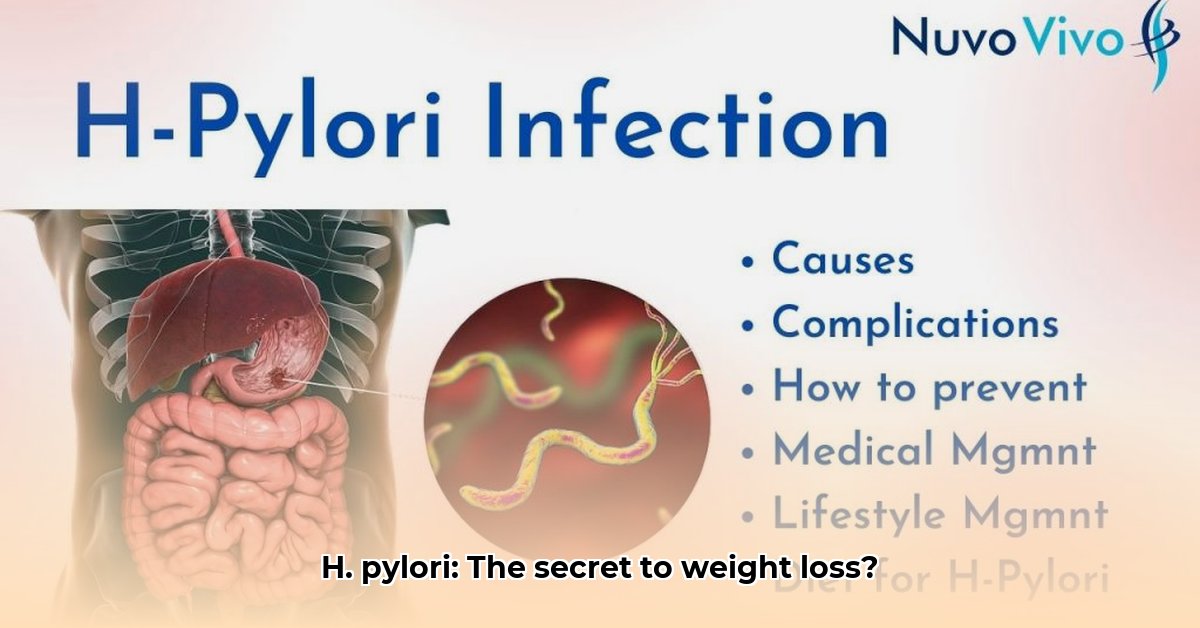
Losing weight unintentionally can be alarming, especially when coupled with digestive issues. This article explores the often-overlooked connection between Helicobacter pylori (H. pylori), a common stomach bacterium, and unexplained weight loss. We'll examine how H. pylori might influence your weight, explore diagnostic methods, review treatment options, and address common misconceptions. Crucially, we'll share anonymized patient narratives to illustrate the diverse experiences of those affected. Our aim is to provide a clear, empathetic understanding of this complex relationship and empower you with actionable steps.
Patient Narratives: The Human Side of Unexplained Weight Loss
Before diving into the science, let's hear from individuals who have experienced unexplained weight loss potentially linked to H. pylori. These accounts, while anonymized to protect patient privacy, offer valuable insights into the realities of living with this condition.
One patient described a gradual, yet significant, weight loss accompanied by persistent nausea and a feeling of fullness even after small meals. This significantly impacted their daily life and caused considerable emotional distress. Another individual recounted a rapid weight loss of over 30 pounds, alongside persistent stomach pain and discomfort. These stories highlight the emotional toll of unexplained weight loss and underscore the importance of seeking professional medical attention. The experience is rarely just about the numbers on the scale; it’s about the emotional and mental burden of grappling with an unknown illness.
This emotional impact is rarely directly addressed in scientific literature, but is a crucial component of the patient experience. How could it not be, considering the stress and anxiety that often accompany unexpected and unexplained weight changes.
The Science of H. pylori and Weight Loss: What Do We Know?
H. pylori is a bacterium that infects the stomach lining, causing inflammation (gastritis) in many individuals. This inflammation can disrupt the body's ability to efficiently digest food and absorb nutrients. However, the exact mechanisms linking H. pylori infection to weight loss are not fully understood. Research suggests several potential factors:
- Reduced Nutrient Absorption: Gastritis caused by H. pylori can hinder the efficient absorption of vital nutrients, contributing to weight loss.
- Altered Appetite: Stomach inflammation and discomfort can significantly reduce appetite, leading to decreased food intake.
- Indirect Factors: The pain and discomfort associated with the infection may prompt dietary changes, often resulting in lower overall calorie intake. This isn't always a conscious decision; it's a natural response to the body's discomfort.
These factors combined may lead to weight loss, but it's important to note that H. pylori is not the sole cause of weight loss in all cases. Many other medical conditions need to be considered. Isn't it striking how many pieces of this puzzle are still being investigated?
Debunking Myths and Misconceptions
It's crucial to dispel common misconceptions about H. pylori and weight loss. Simply experiencing weight loss doesn't automatically mean you have an H. pylori infection. Many other factors can contribute to weight change. Equally important, online accounts, while insightful, should not be considered a substitute for professional medical diagnosis. It's vital to seek medical advice for any significant or unexplained weight changes. A precise diagnosis is crucial for effective treatment and long-term health management.
Diagnosis and Treatment: A Multi-faceted Approach
Diagnosing H. pylori infection relies on various tests, including the urea breath test, stool antigen ELISA test, and endoscopy with biopsy. The choice of test will depend on various factors, including the patient's individual presentation, cost, and availability of tests. Treatment typically involves a course of antibiotics, often combined with medications to reduce stomach acid. Adherence to the prescribed treatment plan is crucial to ensure the eradication of the bacteria and successful outcomes. It's vital to complete the full course of antibiotics.
Dr. Anya Sharma, Gastroenterologist at University General Hospital, emphasizes: "Successful eradication of H. pylori is key. However, even with successful treatment, it's common for some individuals to continue to experience digestive issues. This highlights the need for continual monitoring and appropriate nutritional guidance."
Long-Term Outcomes and Ongoing Management
Effectively managing the long-term impact of H. pylori, including any weight-related issues, requires a comprehensive approach. This includes regular follow-up appointments with your physician to monitor the progress of treatment and address any lingering symptoms. Nutritional counselling from a registered dietician can provide guidance towards restoring a healthy weight and improving overall nutritional intake. Furthermore, addressing emotional and mental health concerns that often arise from dealing with chronic illness is essential for achieving optimal wellness.
Conclusion: Seeking the Right Help
Unexplained weight loss is a serious concern that requires prompt medical evaluation. While H. pylori might play a role in some cases, it's vital to consider other potential medical conditions. Open communication with your doctor, coupled with a thorough diagnosis and adherence to prescribed treatment, is paramount to managing this complex health challenge and addressing the physical and emotional well-being of the patient. Remember, you are not alone in this journey.